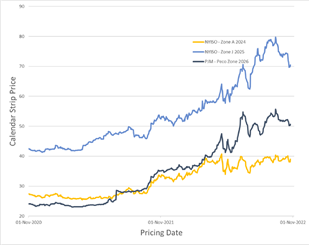Smartest Insight | Issue 96

Our weekly company round-up covers the key market and industry news in one place, so you don’t have to look any further to stay ahead.
November 4, 2022
Market Update:
The EIA reported an injection of 107 Bcf for the week ending 10/28/2022. This marked the sixth week in the last seven that topped the triple digit mark. A streak like that is rare on its own but given where we are in the calendar it is unprecedented. The run over the last seven weeks has essentially removed the deficit to the five-year average. November is currently tracking to be the warmest on record for PJM going back to 1960 even if weather norm temperatures are given to the back half of the month and with the warm start to the month cash gas prices have plummeted. TETCO M3, TETCO M2, and Dominion South are all sub $1 for tomorrow’s gas day. Source cold presented itself over the past weekend and that has led to increased volatility in the gas and power forward markets with each of the last three trading sessions moving nearly 10%. It is that time of the year where weather model runs will be driving the movements in the balance of winter strips.

New Jersey BPU Approves Offshore Wind Transmission
On October 25, 2022, the New Jersey Board of Public Utilities (“NJBPU”) issued an order approving several transmission projects that will integrate offshore wind into PJM’s grid. The order approved the Larrabee TriCollector Solution project, owned by a joint venture between MidAtlantic Offshore Development,
LLC and Jersey Central Power & Light Company (“JCPL”). The project is a collector system which will connect the generators to a single point of injection with the existing grid. The order also approved a number of smaller transmission upgrades to the existing grid that will be built by companies Transource, PECO, BGE, PPL, PSE&G and LS Power. New Jersey has a target to integrate 7.5 GW of offshore wind by 2035. PJM reviewed approximately 80 transmission proposals before recommending the winning projects. PJM will collect the revenue requirements associated with these projects in its Transmission Enhancement Cost (“TEC”) charge from customers located in New Jersey. TEC charges are assessed on electricity suppliers and ultimately paid for by customers.
NYISO Capacity Market Changes
In May 2022, the Federal Energy Regulatory Commission (“FERC”) approved a NYISO proposal to implement “Capacity Accreditation Factors (“CAF”)” that would more accurately establish the amount of capacity that each generator can sell in the capacity market.At its October 27, 2022 Installed Capacity Working Group meeting, NYISO informed stakeholders of its proposed methodology for assigning CAFs to each generator. NYISO plans to bring proposed rule changes to the working group in November. Based on this schedule, the new rules could be implemented for the summer 2023 capacity auction. The proposed changes are likely to reduce the supply available for capacity sales.
President Biden Asked to Intercede in New England Gas Market
On October 27, 2022, Joseph Nolan, Eversource Energy’s CEO, wrote a letter to President Biden asking him to use emergency authority to prevent a natural gas shortage in New England over the winter. Nolan’s letter cited a recent report issued by the Federal Energy Regulatory Commission (“FERC”) that concluded that ISO-NE is vulnerable to severe cold due to the region’s limited natural gas pipeline capacity and high reliance on gas-fired power generation. New England also has three LNG import terminals with total capacity of 2.2 BCf/d. However, to attract volumes to these terminals, the region must compete with global LNG prices, which have increased dramatically due to the globally supply shortages caused by Russia’s Ukraine invasion and the resulting Russian sanctions. As a result, New England gas prices for this winter have spiked, trading between $20-$25/mmBtu. It’s not clear what Biden’s options are, but waiver of the Jones Act is one possibility. The Jones Act requires all goods shipped between two US ports to be carried on ships that are US-built and US-flagged. Waiver of the Jones Act might make it easier to bring LNG cargoes to New England, but isn’t likely to soften the price.
